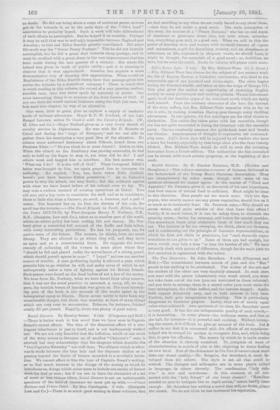Our ware, little or great, give us anyhow a supply
of readable books of military adventure. Major R. C. W. Nutford, of tho 14th Bengal Lancers, writes To Outtbul with the Cavalry Brigade. (W. I. Allen and Co.)—Major Nutford gives us a very lively sketch of cavalry service in Afghanistan. Ho was with Sir F. Roberts at Cabul and during tho " siege of Sherpore," and wo are able to gather from his description a very good idea of the situation. He relates some awkward testimony about, Ydkoob, heard from one Ibraham Khan :—" Do you think he is your friend ? Lefton to this. When the attack on the Residency was proving successful, ho had only to hold up his finger to stop it, yet what did he do ? I and others wont and begged him to interfere. His first answer was, What can I do ? It is the will of God !' When Cavagnari Sibiu s letter was brought to him, wo again prayed him to interpose his authority. Ito replied, ' You, too, have eaten Kafir (Infidel) broad ; you have become Mara yourselves. "' As to Yakoob's power to stop the attack, one may doubt; but the evidence agrees with what wo have hoard before of his refusal even to try. We may note a curious account of minting operations at Cabal. Two old men and a boy seem to constitute the staff, and as to machinery, there is little else than a furnace, an anvil, a hammer, and a pail of water. The hammer has on its face the obverse of the coin, the anvil has the reverse.—The Naval Brigade in South Africa, during the Years 1877-78.79, by Fleet-Surgeon Henry F. Norbury, C.B., R.N. (Sampson Low and Co.), takes us to another part of the world, whore an active policy has boon costing life and money. Mr. Nor- bury gives a somewhat full account of the Kaffir and Zulu tribes, with many interesting particulars. He has his proposals, too, for native wars of the future. The women, he thinks, have too much liberty. They are allowed to go where they will, and they serve as spies and as a commissariat force. He suggests the heroic remedy of collecting all the women in some place where they "should be fed and placed under the surveillance of a strong guard, which should pertnit egress to none." " Loyal " natives are another source of trouble. A man professing loyalty is allowed a pass, which permits him to go whither he will, and under cover of which he not infrequently takes a turn of fighting against his British friends. Such passes were found on the dead bodies of not a few of the enemy. We hear from Mr. Norbury, what wo have heard from other sources, that it was not the usual practice to entrench a camp, till, we sup- pose, the terrible lesson of Isandula was given us. The most interest. ing part of the book is the account of the weeks spent in the beleaguered camp at Elaavo. There seems never to have been any considerable danger, but there was scarcity, at least of some things which are very near to necessaries. Tobacco, for instance, fetched nearly £5 per pound. Happily, there was plenty of good water•.






































 Previous page
Previous page